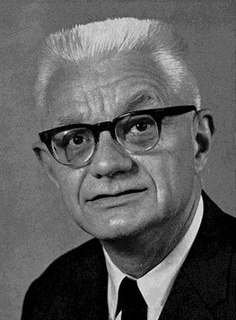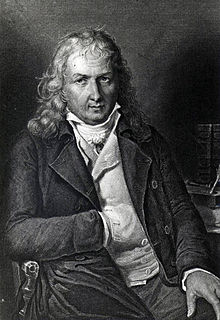A Quote by Thomas Huxley
The mathematician starts with a few propositions, the proof of which is so obvious that they are called self-evident, and the rest of his work consists of subtle deductions from them. The teaching of languages, at any rate as ordinarily practiced, is of the same general nature authority and tradition furnish the data, and the mental operations are deductive.
Related Quotes
The ends of scientific classification are best answered, when the objects are formed into groups respecting which a greater number of general propositions can be made, and those propositions more important, than could be made respecting any other groups into which the same things could be distributed. ... A classification thus formed is properly scientific or philosophical, and is commonly called a Natural, in contradistinction to a Technical or Artificial, classification or arrangement.
In truth, there never was any remarkable lawgiver amongst any people who did not resort to divine authority, as otherwise his laws would not have been accepted by the people; for there are many good laws, the importance of which is known to be the sagacious lawgiver, but the reasons for which are not sufficiently evident to enable him to persuade others to submit to them; and therefore do wise men, for the purpose of removing this difficulty, resort to divine authority.
Few intellectual tyrannies can be more recalcitrant than the truths that everybody knows and nearly no one can defend with any decent data (for who needs proof of anything so obvious). And few intellectual activities can be more salutary than attempts to find out whether these rocks of ages might crumble at the slightest tap of an informational hammer.
The propositions of mathematics have, therefore, the same unquestionable certainty which is typical of such propositions as "All bachelors are unmarried," but they also share the complete lack of empirical content which is associated with that certainty: The propositions of mathematics are devoid of all factual content; they convey no information whatever on any empirical subject matter.
Life consists Of propositions about life. The human Revery is a solitude in which We compose these propositions, torn by dreams, By the terrible incantations of defeats And by the fear that the defeats and the dreams are one. The whole race is a poet that writes down The eccentric propositions of its fate.
To be a religions man and to pray are really one and the same thing. To join in the thought of God with every thought of any importance that occurs to us ; in all our admiration of external nature, to regard it as the work of His wisdom ; to take counsel with God about all our plans, that we may be able to carry them out in His name ; and even in our most mirthful hours to remember His all-seeing eye ; this is the prayer without ceasing to which we are called, and which is really the essence of true religion.




































